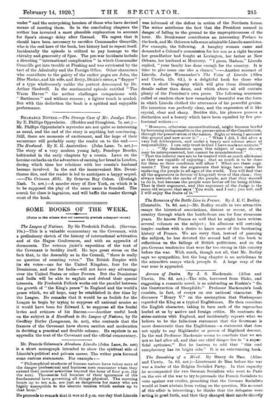SOME BOOKS OF THE WEEK.
Illetice in this CO11412181 does not necessarily preclude subsequent rovics.1 The League of Nations. By Sir Frederick Pollock. (Stevens. 10s.)—This is a valuable commentary on the Covenant, with a preliminary sketch of the history of international arbitration and of the Hague Conferences, and with an. appendix of documents. The veteran jurist's exposition of the text of the Covenant is lucidity itself. He lays great stress on the fact that, in the Assembly as in the Council, " there is really no question of counting votes." The British Empire with its six votes—one for the United Kingdom, four for the Dominions, and one for India—will not have any advantage over the United States or other Powers. But the Dominions and India will be able to explain and defend their special interests. Sir Frederick Pollock works out the parallel between the growth of " the King's peace " in England and the world's peace which, we all hope, may be established in due time by the League. He remarks that it would be as foolish for the League to begin by trying to suppress all national armies as it would have been for Edward L to suppress all the feudal levies and retinues of his Barons.—Another useful book on the subject is A Handbook to the League of Nations, by Sir Geoffrey Butler (Longman, 5s. net), who contends that the framers of the Covenant have shown caution and moderation in devising a practical and flexible soheme. He reprints in an appendix the text of the Covenant and the official commentary.


































 Previous page
Previous page